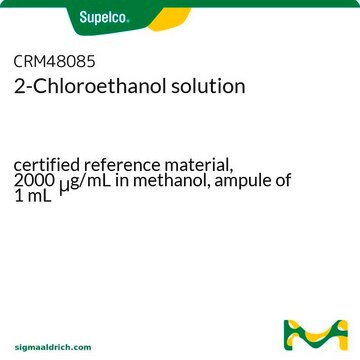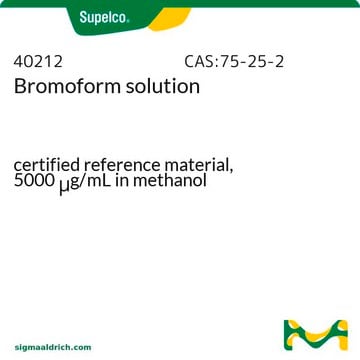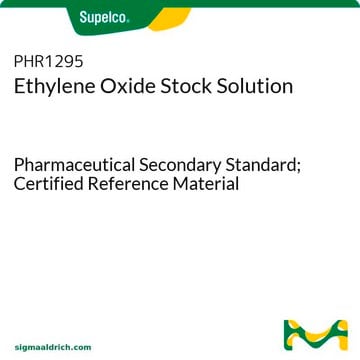48838
Ethylene oxide solution
certified reference material, 50 mg/mL in methanol
About This Item
Recommended Products
grade
certified reference material
TraceCERT®
Quality Level
product line
TraceCERT®
CofA
current certificate can be downloaded
feature
standard type calibration
packaging
ampule of 1 mL
concentration
50 mg/mL in methanol
technique(s)
HPLC: suitable
gas chromatography (GC): suitable
application(s)
agriculture
cleaning products
cosmetics
environmental
food and beverages
personal care
format
single component solution
storage temp.
2-8°C
SMILES string
C1CO1
InChI
1S/C2H4O/c1-2-3-1/h1-2H2
InChI key
IAYPIBMASNFSPL-UHFFFAOYSA-N
Looking for similar products? Visit Product Comparison Guide
General description
Ethylene oxide is a toxic and flammable liquid, which can be obtained via vapor phase oxidation of ethylene. It can be used in the synthesis of ethylene glycol, glycol ethers, surfactants and ethanolamines. It is an industrially important chemical, that can be used as fumigant to sterilize dental and medical equipments.
Application
Other Notes
Legal Information
Signal Word
Danger
Hazard Statements
Precautionary Statements
Hazard Classifications
Acute Tox. 3 Dermal - Acute Tox. 3 Inhalation - Acute Tox. 3 Oral - Carc. 1B - Eye Dam. 1 - Flam. Liq. 2 - Muta. 1B - Repr. 1B - Skin Corr. 1 - STOT RE 2 - STOT SE 1
Target Organs
Eyes,Central nervous system, Nervous system
Storage Class Code
3 - Flammable liquids
WGK
WGK 3
Flash Point(F)
50.0 °F - closed cup
Flash Point(C)
10 °C - closed cup
Personal Protective Equipment
Choose from one of the most recent versions:
Already Own This Product?
Find documentation for the products that you have recently purchased in the Document Library.
Customers Also Viewed
Our team of scientists has experience in all areas of research including Life Science, Material Science, Chemical Synthesis, Chromatography, Analytical and many others.
Contact Technical Service










